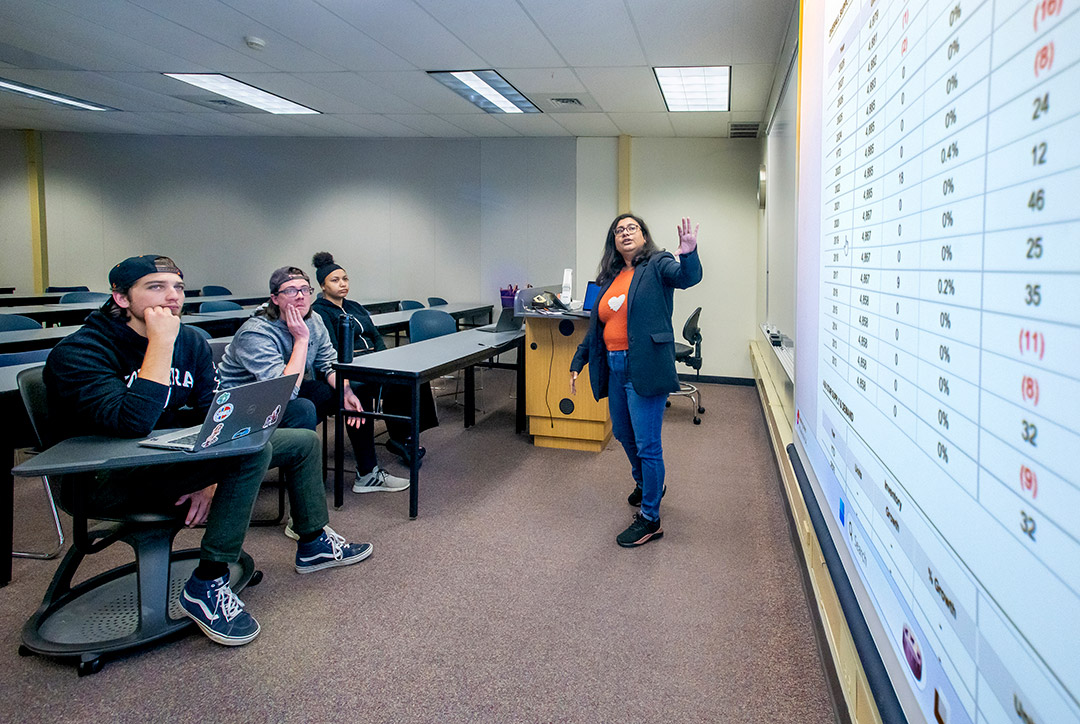Real estate in hospitality minor equips students with in-demand skills for diverse careers in hotel development, asset management, and more

Carlos Ortiz/RIT
Assistant Professor Debanjana Dey chats with a student group in her hospitality real estate development class. The real estate in hospitality minor, open to all students, offers students a unique perspective on the commercial property management sector.
RIT’s new real estate in hospitality minor gives students the opportunity to connect real estate knowledge with hospitality management practices. Launched in fall 2023, this minor at Saunders College of Business is designed to equip students with specialized skills for careers in both industries.
Edwin Torres Areizaga, associate professor and chair of the Department of International Hospitality and Service Innovation, created the minor to offer students a unique career path focused on understanding commercial properties within hospitality.
To learn more
Saunders College of Business will host a real estate conference from 11 a.m. to 3:30 p.m., Thursday, Nov. 21, at the Susan R. Holliday Center in Max Lowenthal Hall. Led by keynote speaker Mark Laport ’92 MS (hospitality tourism management), co-founder and CEO of Concord Business Enterprises, the conference offers a chance for students to interact with real estate executives and other industry professionals and gain a comprehensive understanding of the diverse pathways in real estate.
“In recent years, the hotel industry has separated ownership, management, and branding, meaning the company that owns a hotel building is often not the same one that runs or brands it,” Torres Areizaga said. “Our new minor gives students a pathway to work in areas like hotel development, brokerage, and asset management—preparing them for roles beyond hotel operations and aligning with these industry shifts.”
This minor is open to students within Saunders College and from other disciplines who are interested in real estate. Students will learn analytical thinking, marketing, and the key roles of ownership, management, and branding, as well as the value of networking and the power of negotiation.
“We don’t just want to teach people how to work spreadsheets,” Torres Areizaga said. “We want them to know how to communicate with architects and engineers and understand how major hospitality investments like hotels, restaurants, or theme parks operate. That way, if a property is underperforming, they can look beyond the numbers to identify the root cause.”
Courses in the minor build these essential skills. Debanjana Dey, an assistant professor who teaches Hospitality Real Estate Development and Hospitality Analytics, sees untapped potential for students in this field.
“There’s a lot of interest in hospitality, but many people don’t realize the strong career and earning potential in hospitality real estate,” Dey said. “I cover both commercial and residential real estate, since both offer valuable insights. I find that most students have some exposure to real estate, like a family investment property or a construction background, but they don’t see it as a career option. My goal is to show them that this minor is more general than people realize; that it can open many professional paths they might not have considered.”
Assistant Professor Soon Hyeok Choi brings an additional perspective with his Hospitality Asset Management and Investment course, integrating AI and machine learning to help students prepare for technology-driven changes in the industry. Choi also shares insights from his research on legislation, such as Hawaii Senate Bill 2919, to show how laws affect both residential and commercial sectors.
“We’re not just learning how to pick a site and generate cash flow for the next nine years,” Choi said. “That’s a one-dimensional approach. We’re trying to understand the entire ecosystem of real estate—the local labor market, demographics, and housing market—so we can effectively tackle the commercial side. When you think about hotel resorts, who works in those spaces? The local workforce, tied to local residences. Understanding demographics and housing affordability directly impacts a property’s ability to operate successfully.”
The hope is that students who graduate get a good return on investment from their education, transitioning into careers such as analysts, marketing specialists, commercial brokers, or those who want to build their own real estate portfolio as entrepreneurs.
Looking ahead, Torres Areizaga hopes to expand the program by adding more introductory courses to draw non-majors and offering students the chance to study these principles internationally through existing hospitality global rotation programs at RIT Croatia, with an opportunity to add courses at RIT Dubai as well.









